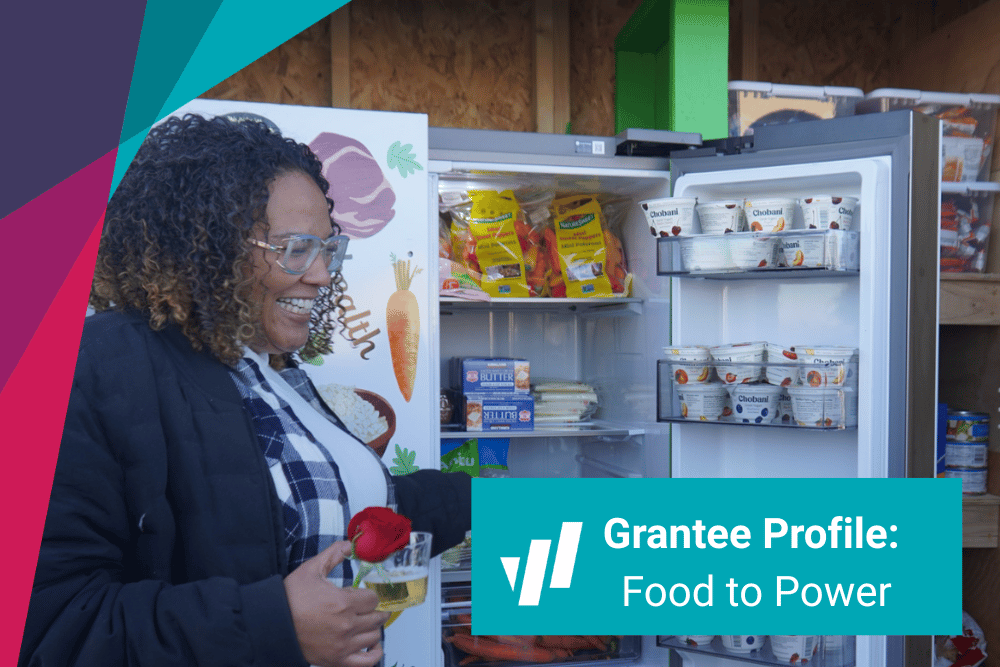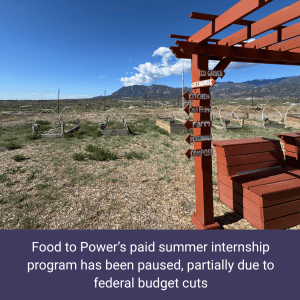
Grantee Spotlight: Maintaining Faith in Community Amid Federal Budget Cuts
Bringing Access to Fresh Food to Colorado Springs is Personal for Patience Kabwasa
The executive director of Food to Power maintains faith in community amid federal budget cuts
Food to Power is more than the name of the organization she leads – to Patience Kabwasa, it could be an entire chapter in her life story.
A belief that guides the Colorado Springs nonprofit is that food is the essential source of power for one to work, play, serve, and live. For Patience, the passion is personal.
She experienced food insecurity, like many in the Colorado Springs’ community, after a divorce left her a single mother of three children under 10 years old. At the time, she had a low-paying job and no access to a car, so she relied on the Springs’ under-resourced public transit system. Sometimes, her commute took more than two hours by bus. On those nights, fast food was the most calorically dense way to feed her family and still be able to spend time with them.
Not having access to fresh food because of cost and proximity shaped her future community leadership.
“You shouldn’t have to choose between groceries and other needs of your children”
She became a gardening coordinator for Relevant Word Ministries and worked collaboratively with Colorado College students to manage food programs for Mobile Meals in the Hillside neighborhood. Then, she joined Colorado Springs Food Rescue. When she became the executive director, she led the construction of the Hillside Hub and the rebrand from Colorado Springs Food Rescue to Food to Power. As the name suggests, its mission is to use fresh food as the vehicle to empower their community in the Hillside neighborhood.
“As a mom, you shouldn’t have to choose between groceries and meeting other needs of your children,” said Patience, who tells a story of a woman who saves money by getting her produce from Food to Power and is therefore able to pay to take her child to the movies now. “Often those recreational types of things are looked at as luxuries or not as beneficial to folks who aren’t getting their basic needs met. Knowing that one of our programs provided space for her to invest in her family in more than one way is everything.”
Knowing that one of our programs provided space for her to invest in her family in more than one way is everything – Patience Kabwasa
Feeding the community more than physical sustenance is one of the most fulfilling parts of FTP’s work. “Food is physical, cultural, ceremonial,” she said. “It’s present in all the important things in our lives.”
Its omnipresence is why Food to Power addresses the food system holistically – from access to education to production. At its Hillside Hub, the first and only neighborhood food center in Colorado Springs, Food to Power cultivates acres of earth to provide food, jobs, and education for and with community.
Access: Food to Power’s No Cost Grocery Program a critical community resource
 Food to Power’s Hillside Hub provides a No Cost Grocery Program that distributes fresh, nutritious food grown on site and recovered from local distributors. For example, it takes a bruised, yet perfectly good apple from Whole Foods and gives it to someone who needs it. Located in the heart of Colorado Springs’ Hillside neighborhood, a historically Black area where the highest percentage of impoverished households are located and nearly one-third of residents don’t have a car, it’s a critical community resource. The “Hub” fills food access gaps for residents who only have access to two upscale grocers and a 7-Eleven. It’s changing Hillside’s environmental legacy, too. Located “a stone’s throw” from a wastewater treatment facility and tire processing plant, the Hub gives back to the land by diverting waste from the landfill and improving air quality.
Food to Power’s Hillside Hub provides a No Cost Grocery Program that distributes fresh, nutritious food grown on site and recovered from local distributors. For example, it takes a bruised, yet perfectly good apple from Whole Foods and gives it to someone who needs it. Located in the heart of Colorado Springs’ Hillside neighborhood, a historically Black area where the highest percentage of impoverished households are located and nearly one-third of residents don’t have a car, it’s a critical community resource. The “Hub” fills food access gaps for residents who only have access to two upscale grocers and a 7-Eleven. It’s changing Hillside’s environmental legacy, too. Located “a stone’s throw” from a wastewater treatment facility and tire processing plant, the Hub gives back to the land by diverting waste from the landfill and improving air quality.
Since 2019, Food to Power saved 2.6 million pounds of fresh food — worth nearly $10 million — from local landfills and gave 100% away. In 2024, it saved and gave away more than 400,000 pounds of fresh food — equivalent to 337,000 meals and worth $1.5 million.
Education: Food to Power transfers generational knowledge to high school students
The Food Systems Leadership for Youth (FLY) paid summer internship program employs high school-aged students and equips them with leadership and knowledge about the food system. Additionally, Food to Power hosts community member-led workshops to foster the generational transfer of knowledge around cooking, gardening, and composting. Through advocacy and organizing, it aims to undo a system that leads people into the free food line in the first place. “The aspiration is that a generation from now, young people can reflect on their own relationship on learning to grow or compost, getting their hands in the soil, or thinking about food justice in a different way,” said Patience.
Production: Food to Power regenerate the local food ecosystem
Food to Power Compost (FTP Compost) was the city’s first residential food scrap pick-up program and has added commercial pick-up and drop-off stations. This social enterprise regenerates the local food ecosystem by recycling the food waste in topsoil-repairing compost or livestock feed. In 2024, FTP Compost collected over 250 tons of food scraps from almost 650 households and businesses across Colorado Springs. This earned revenue model is a way to brace against the “shifting winds” of federal funding and philanthropic investments.
Public support programs on the chopping block will cut access to food for millions of Americans
In 2025, WFCO doubled our investment in Food to Power and other Women & Girls of Color Fund grantee partners—but the organization now faces a daunting challenge. A devastating loss of federal funding from the EPA leaves a gaping hole in its annual budget to support composting operations, just as an unprecedented surge in community need looms on the horizon. Critical support programs like Medicaid and SNAP are on the chopping block of the inaptly named “Big, Beautiful Bill” and will cut access to healthy food for millions of Americans. The stakes have never been higher, even when considering that Food to Power saw a 148% increase in demand for the No Cost Grocery Program in 2024.
A two-year, unrestricted grant from The Women’s Foundation of Colorado’s Women & Girls of Color Fund helps cover ongoing costs of programming at the Hub so it can respond to immediate community needs while pursuing social change. However, WFCO’s grant does not come close to making up for increased community demand and decreased supply.
“Patience is not only imagining a better future—she is building it. Like all the leaders we invest in through the Women & Girls of Color Fund, Patience’s lived experience is fueling bold and innovative solutions to Coloradans’ most pressing challenges,” said Camisha Lashbrook, WFCO director of grantmaking. “As our government abandons programs that lift people out of poverty and divests from the proven power of diversity, we are proud to grow our investment in their leadership. We invite our community to join us in funding the powerful change they are leading.”
WFCO’s increased investment in Food to Power can’t make up for increased community demand, loss of federal funds
 Federal cuts to other agencies, including USAID and USDA mean that Food to Power is also navigating a diminished food supply from farmers. Coupled with the rising cost of food that is resulting in slimmer margins for grocers, it’s getting harder to get fresh food donations. Consequently, to cover costs, the FLY paid summer internship program that provided income to residents has been paused. Food to Power is using this moment to create a plan to develop the strong talent pool of green industry professionals that Colorado Springs will need to survive the oncoming climate crises.
Federal cuts to other agencies, including USAID and USDA mean that Food to Power is also navigating a diminished food supply from farmers. Coupled with the rising cost of food that is resulting in slimmer margins for grocers, it’s getting harder to get fresh food donations. Consequently, to cover costs, the FLY paid summer internship program that provided income to residents has been paused. Food to Power is using this moment to create a plan to develop the strong talent pool of green industry professionals that Colorado Springs will need to survive the oncoming climate crises.
Despite these massive shifts, Patience maintains faith. She’s persevered through unimaginable circumstances before – from her lived experience with food insecurity to COVID-19.
Despite massive shifts, Patience maintains faith in the fierceness of community, track record of resilience
“It’s disappointing, but I think about the fact that we started building during COVID after a six-year capital campaign. We made it through all kinds of shipment delays and increases in construction supplies that raised the cost of building by $500,000. The money that we needed did eventually come. I don’t say that unaware of the reality before us, but knowing that we are resilient. This is a time for organizing and mobilizing differently,” said Patience, who believes the Colorado Springs community will come together to take care of one another.
“My community’s spiritual lives are deeply connected to their commitment to service,” she said. “I love the fierceness of this community, whatever one’s religious practice is. We are rooted in tenets of giving and the connection to earth and each other.”
Patience’s community care extends beyond Food to Power. She also was the DiverseCity columnist for the Colorado Springs Independent, where she wrote about disparities and opportunities for people of color in the Pikes Peak region.

